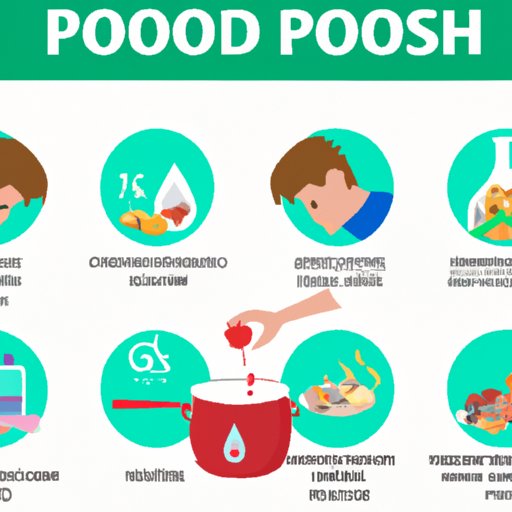
I. Introduction
Food poisoning is a type of illness caused by consuming contaminated food or drink. It is a common problem and can affect anyone. The symptoms are unpleasant, and in severe cases, it can be life-threatening. In this article, we will explore the symptoms, causes, prevention, and treatment for food poisoning. By knowing the information in this article, you can make informed decisions to avoid and manage food poisoning.
II. Symptoms of Food Poisoning
The symptoms of food poisoning can differ based on the type of contamination. However, the most common symptoms include nausea, vomiting, abdominal cramps, fever, diarrhea, fatigue, and dehydration. The severity of symptoms can range from mild to severe, and in some cases, it can lead to hospitalization.
III. Causes of Food Poisoning
The common causes of food poisoning are bacteria, viruses, parasites, toxins, and chemicals. The most common bacteria causing food poisoning are Salmonella, Listeria, and E. coli. Foods such as raw meats, poultry, eggs, and unpasteurized milk are most susceptible to contamination. Leafy greens, fruits, and vegetables can also be contaminated, especially if not washed properly.
IV. Prevention of Food Poisoning
Prevention is the best strategy for avoiding food poisoning. Here are some measures to prevent it:
- Cooking meat and poultry thoroughly to kill bacteria
- Frequent hand and surface washing with soap and warm water
- Separating raw and cooked foods to prevent cross-contamination
- Storing food at safe temperatures, such as in the refrigerator or freezer
- Being cautious with foods susceptible to contamination, such as sprouts and oysters
V. Food Poisoning in Children
Children are more vulnerable to food poisoning than adults because of their undeveloped immune systems. Signs of food poisoning in children include stomach cramps, diarrhea, vomiting, fever, and fatigue. Dehydration is a risk for children with food poisoning. To prevent food poisoning, parents should follow the same prevention measures as adults. It is essential to seek medical help immediately if a child exhibits any of these symptoms.
VI. Natural Remedies for Food Poisoning
Natural remedies can help relieve symptoms of food poisoning. Here are some remedies:
- Ginger helps with nausea and vomiting
- Peppermint soothes the stomach and relieves cramps
- Probiotics aid digestion and fight bad bacteria in the gut
- Soothing foods and drinks such as tea, soup, and bananas can also help with recovery
VII. When to See a Doctor
In some cases, food poisoning can lead to complications and require medical attention. Complications can include severe dehydration, kidney failure, and nerve damage. Tests such as blood tests, stool samples, and imaging may be necessary to diagnose food poisoning. If you experience any symptoms or complications of food poisoning, seek medical attention immediately.
VIII. Conclusion
Food poisoning is a common health problem that affects anyone. It is important to know the symptoms, causes, prevention, and treatment for food poisoning to avoid and manage it. By following prevention measures, recognizing food poisoning symptoms, and seeking medical attention when necessary, you can prevent and recover from food poisoning. Additional resources can provide more information on prevention, treatment, and management of food poisoning.




